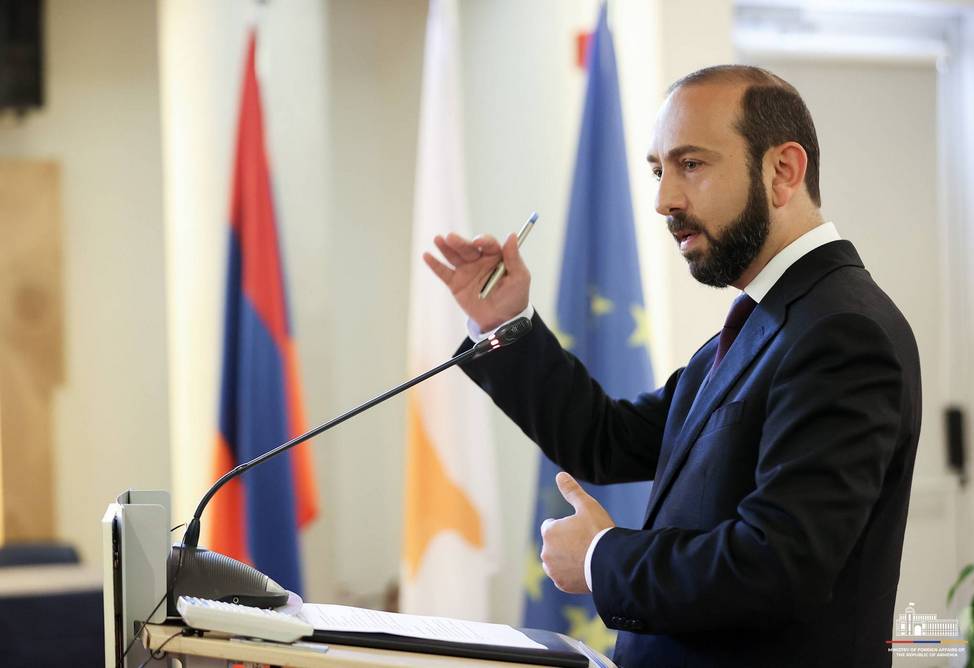Mirzoyan stated Armenia's readiness to immediately determine place, time and date of signing peace treaty with Azerbaijan

YEREVAN, April 15. /ARKA/. The Armenian side thinks that consultations can begin immediately to determine the location, time, and exact date for signing a peace agreement with Azerbaijan, Armenian Foreign Minister Ararat Mirzoyan said in an interview with Turkish television channel NTV.
He described the agreement between Armenia and Azerbaijan on the text of the draft peace treaty between the two countries as an unprecedented and historic event, in which both sides mutually recognized each other’s territorial integrity within the borders that the Soviet Socialist Republics had at the time of the collapse of the Soviet Union.
"The parties agreed not to interfere in each other’s internal affairs and reached an agreement on a number of other important provisions. In addition, if this document is ratified and enters into force, a bilateral commission will be established to monitor the implementation of the agreement and serve as a platform for resolving any misunderstandings or specific situations that may arise on the ground," he said.
When asked whether the agreement could be signed in a third country, the minister responded that it could take place either at the Armenia-Azerbaijan border or in any third country acceptable to both Yerevan and Baku.
"All of this can be a subject of discussion," he added.
However, according to the Armenian Foreign Minister, immediately after the announcement of the agreed text, the Azerbaijani side put forward several preconditions, particularly concerning the Minsk Group and the Armenian Constitution.
"As far as I understand, there may be other considerations as well. Our approach is this: we can begin the process by laying one brick, then another, and eventually we’ll see that together we’ve built, for example, a strong bridge. Or we can sit and wait for several hundred more years, trying to determine whether previous approaches are still applicable, whether the conflict is truly over, or whether obstacles remain. Our position is that we must focus on the constructive side of the issue ,on opportunities and the future rather than constantly digging into the past and seeing only obstacles," he explained.
Regarding some of the ideas voiced by the Azerbaijani side, particularly concerning the Minsk Group, Mirzoyan emphasized that Armenia’s position is clearly known.
"If we recognize that the conflict has been resolved and this fact is confirmed by a peace agreement, then the Minsk Group and its subordinate structures are no longer relevant. It is based on this logic that we proposed signing two documents on the same day: the peace agreement and a joint statement addressed to the OSCE or its member states, which would initiate the process of dissolving the Minsk Group," he said.
On the Peace Process between Armenia and Azerbaijan
On March 13, the Armenian Foreign Ministry confirmed that the draft treaty titled “On the Establishment of Peace and Interstate Relations between the Republic of Armenia and the Republic of Azerbaijan” had been finalized, and that negotiations over its text had been completed. The Armenian side stated that the document was ready for signing, and that Yerevan was prepared to begin consultations with Baku regarding the timing and location of the signing.
According to Prime Minister Nikol Pashinyan, the current version of the draft peace treaty can be considered a set of mutual concessions that is acceptable to Armenia. He noted that two provisions in particular which had long been sticking points in negotiations were eventually resolved through compromise. These provisions involve the non-deployment of third-country forces along the entire Armenia-Azerbaijan border, and the mutual withdrawal of lawsuits filed in international courts, along with refraining from actions directed against each other.
The President of Azerbaijan had previously highlighted these two areas of disagreement as well.
Baku has also presented several new demands as preconditions for signing the peace treaty, including reforming the Armenian Constitution and dissolving the OSCE Minsk Group.



